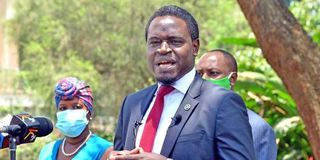Havi's case on Sputnik jab ban certified as urgent

Law Society of Kenya President Nelson Havi addresses a press conference on October 7, 2020 at the LSK offices in Nairobi.
A case filed by the Law Society of Kenya challenging the government's decision to ban importation of Covid-19 vaccines by the private sector has been certified urgent by the High Court in Nairobi.
To expedite the hearing of the case, Justice Anthony Mrima also directed the LSK to furnish the Attorney-General as well as Health and Interior Coordination of Government Cabinet secretaries with the court papers within two days so that they respond to the claims levelled against government in the case.
The AG and the Cabinet secretaries are expected to file their responses within 10 days. The judge also directed the parties to file their written arguments within seven days and fixed the hearing for May 5, 2021.
LSK through its president Nelson Havi wants government to lift the ban imposed on the importation, distribution and administration of Covid-19 vaccines by the private sector.
Mr Havi wants the court to declare the government's decision unconstitutional and stop its implementation and enforcement.
He argues that the ban and cancellation of licences issued to importers and distributors of the vaccine should not have been made at a time the government aims at inoculating at least 30 per cent of the country’s population by January next year.
He says the ban, which was imposed after a section of Kenyans led by Deputy President William Ruto started going for Russia’s Sputnik vaccine, violates article 43 of the Constitution, which guarantees the right to the highest attainable standard of health.
This includes the right to healthcare services and uninhibited emergency medical treatment.
LSK is also challenging the raft of Covid-19 mitigation measures imposed by President Uhuru Kenyatta, including lockdown and cessation of movement in five counties and the night-to-dawn curfew.
According to Mr Havi, the President's public order dated March 26, 2021 is not founded on any provision of the law and is, therefore, unlawful, unconstitutional and a violation of the Constitution.
Mr Havi argues there is no scientific evidence of the efficacy of night curfew in combating a health pandemic in general and Covid-19 in particular.
With regard to the rules on restriction of movement, the lawyer says these are statutory instruments and cannot be enforced as law through arrests and criminal prosecution of the offenders in any court in Kenya without prior public participation and approval by Parliament.
"The same cannot be used to limit freedom of movement, right to enter, remain and reside anywhere in Kenya and the right to assemble, demonstrate, picket or petition and any such limitation is unconstitutional," says Mr Havi.
He argues that President Kenyatta, together with the Interior and Health Cabinet secretaries, have limited the rights and fundamental freedoms in the Bill of rights.
In his view, the President and the two CSs erred in issuing and implementing decisions that require legislation and parliamentary approval in combating Covid-19.
He says the public order issued by the President, the curfew declared by Interior CS and the restriction of movement of persons declared by the Health CS do not conform to the guidelines issued by the World Health Organization (WHO) for combating Covid-19.
"The three decisions are manifestly unlawful and unconstitutional and their implementation and enforcement ought to be stayed (suspended) to prevent the ends of justice from been defeated by the respondent in what is otherwise an unlawful and unconstitutional enterprise undertaken in the guise of combating Covid-19," he tells the court.
Mr Havi says Kenya is yet to enact the Disaster Preparedness and Relief Act, as advised by WHO as a legal framework for dealing with natural disasters or other public emergencies.
"The Government of Kenya has relied upon directives of the President, orders, rules and regulations issued by the Cabinet secretary for Health under the obsolete Public Health Act Cap 242 of the laws of Kenya," says the lawyer.
Kenya, he says, is also relying on orders issued by the Interior CS under the “obsolete” Public Order Act Cap 56 of the laws of Kenya “to impose and implement unconstitutional measures to combat Covid-19”.
"Several members of WHO including but not limited to Italy and the United Kingdom have enacted legislation to enable them to combat the Covid-19 pandemic. Such legislation was enacted within a maximum period of 60 days and a mimimum of four days of the outbreak of Covid-19 in those two countries," Mr Havi states in the court papers.
He also argues that the Kenyan government has not given any final contingency plan, nor any report on measures taken to treat those infected with Covid-19 and prevent further infections including through vaccination.





